(continued from other column)
The
final aspect of the pottery process we relate to is the one
demonstrated whenever you drop your china: pottery is fragile.
The Bible contains numerous references to the fragility of
pottery. (Gideon in Judges 7; Eliphaz in Job 4:18-20; Job in Job
10:9; Ps 2: 9; Ps 22:15; Isa 30:14; Jer 19:1-13; Daniel 2:41-45;
Rev 2:26).[ix]
In some ways, I think this is the property of pottery that
we can identify with most! We all feel fragile, especially
in areas of Christian service. Who can live up to the perfection
God demands? Who can feel up to the task of being an Ambassador
for Almighty God? But perhaps we should look at it a different
way. What gives fine China such an enduring value if it is
not the fact that it is equally fragile?
I
believe this is the heart of the often-quoted passage that we
started with. 2 Cor 4:7 says: “But we have this treasure in
earthen vessels, that the excellence of the power may be of God
and not of us.” (NKJV*) Paul concludes this passage by saying:
15“For all things are for your sakes, that grace,
having spread through the many, may cause thanksgiving to abound
to the glory of God.” …or as CEV puts it: (v4.15)“…so that
more and more people will know how kind God is and will praise and
honor him.” (CEV*)
God knows we are fragile, but does not see it as a liability. To
Him, it is an asset, for it makes it easier for mankind to see Him
in us and through our service!
“But we have this treasure in earthen vessels,
that the excellence of the power may be of God and not of us.” (2
Cor 4:7 NKJV)
When I read this scripture, I see an unanswered question. Paul
says we have THIS treasure in earthen vessels, and so the obvious
question is: “WHAT treasure?” I want to use the rest of our time
to deal with this question.
To
find an answer one might think that we should simply be able to
look back a verse or two, but such an observation does not come
from one who is very familiar with Paul’s writings! Paul had an
amazing ability to construct thoughts that took pages to express!
In this case, as I searched for a description of “this treasure,”
I found that one “answer” seemed to point backward to another, and
then another, until I ended up almost two chapters earlier, back
in 2 Cor chapter 2! Now, perhaps Paul was only thinking of my
final point or two when he penned chapter 4, verse 7, but either
way, these insights from 2 Corinthians are all a part of “this
treasure” that God places in us—His earthen vessels.
Now, I don’t have time to read the entire, complicated passage,
but if you will follow along (and please do read the scripture
passages later!) I think you can see the half dozen or so
facets of this remarkable treasure.
First, the treasure is a divine fragrance. Look at 2 Cor.
2:14-16[x].
Fragrances were even more important to the ancient world than they
are today. The magi chose fragrances to bring to the Christ child
as a token of their utmost esteem. (Matt 2:11) Judas complained
about the fragrance that Mary lavished on Christ because it was
worth almost a year’s wages! (John 12:5) But even this is nothing
in comparison to the treasure in us of the fragrance of Christ,
because Paul says THIS aroma confronts humanity with the eternal
choice between LIFE and DEATH. So, “this treasure” includes a
Divine fragrance.
Secondly, this treasure is likened unto Love Letters from
God to a lost world. Look down to 2 Cor 3:2-3.[xi]
Paul tells the reader that we are “epistles of Christ,” or (CEV)
“you are like a letter written by Christ and delivered by us.”
This letter is written on tablets of flesh by the Spirit of the
living God, “known and read by all men.” To put this another way,
YOU are the only Bible that many people will ever read,
particularly people in China. Think of it! Our lives are supposed
to be like a treasured love letter proclaiming God’s love to the
people around us!
Thirdly, this treasure is the gift of sufficiency as one of
God’s ministers. This is in 3:5-9, especially verse 6 that says
that God has made us “sufficient as ministers of the new
covenant”.[xii]
Now don’t forget that to Paul a “minister” was above all one who
serves and represents the interests of someone greater than
himself—we still use the term this way referring to government
positions. Paul develops this thought at length in chapters three
and four. But in a nutshell, God considers us “sufficient” for
ministry because He places in these earthen vessels a
“manifestation of truth.” (2 Cor 4:2). Then, all He has to do (see
verse 3) is take away the veil that blinds sinners, and point them
to us! So, part of the treasure in us is sufficiency as ministers
of the New Covenant.
Next, we see the treasure described in terms like “hope”
and “liberty.” Hope (2 Cor 3:12) is a priceless commodity!
Ask a doctor, or ask someone undergoing life’s trials! Hope can
literally mean the difference between life and death! And liberty
(3:17) is a great treasure—greater perhaps than I would have given
mankind, because it is also our liberty that so often distracts us
from serving our Potter, and leads us to complain when we don’t
like the way He is shaping the clay!
The “earthen” side of our liberty makes the next facet of this
treasure even more remarkable. Look at 3:18 and you will see that
the treasure placed in us includes a reflection of God’s glory.
“But we all, with unveiled face, beholding as in a mirror the
glory of the Lord, are being transformed into the same image…”
A
mirror (or “glass” in King James English) can only reflect what is
really there, so if we see God’s glory “as in a mirror” then this
reflection is proof of the treasure God has placed in us! Isn’t
that cool?
And finally, in the verses immediately before the text that
started our search, we see that God gifts us with the treasure of
the light of the gospel of the glory of Christ (2 Cor 4:4).
That is, we are a torch fueled by Christ’s glory to show the
perishing a way out of the darkness. The treasure in us is the
light of the gospel of the glory of
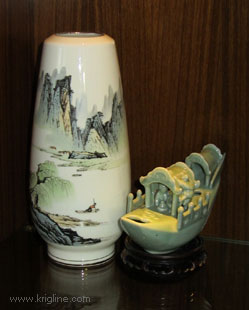 Christ.
Christ.
This brings us back to 4:7. It is HERE [3 verses later] that Paul
calls us earthen vessels—fragile, durable, valuable, unique
containers of this remarkable treasure: a divine perfume,
love, hope, liberty and light that reflects the glory of Christ.
Now I don’t know about you, but when I look at myself I do not see
“this treasure”—I just see an earthen vessel. I know my
faults and fragility too well. So, when I read Paul’s description
of this treasure God has placed in me, I can’t help but wonder
WHY? Why would God chose “earthen vessel” people like me and you
to contain such an incredible treasure? Use angels, Lord; or use
saints or pastors; but why use me?
Of
course, Paul supplies the answer in the same verse (4:7): “But we
have this treasure in earthen vessels, that the excellence of the
power may be of God and not of us.”
Paul goes on to say that he and his fellow ministers (i.e., those
“earthen vessels” who carry this treasure) are hard pressed,
perplexed, persecuted, and struck down. But their lives show the
“dying of the Lord Jesus” so that (v4.11) “the life of Jesus also
may be manifested.” In other word (and skipping down to v4:15 in
the CEV): God chooses to place His treasure in earthen vessels
like us “…so that more and more people will know how kind God
is and will praise and honor Him.” (CEV) It’s not about
us… it’s about HIM.
So
(to conclude), God is the potter, and we are the clay. We embrace
this truth because we can identify with the process by
which pottery is made, and the properties inherent in the
finished product. We are made of clay, molded by
skilled hands, sealed by the Spirit, and made useful
through times of fiery trial. Like fine China we must be
washed repeatedly from the grime of sin. We are uniquely
beautiful, useful and valuable in God’s eyes. We
are durable—lasting forever as “containers” of His glory.
And finally we are fragile—so that our lives will always
point to the greatness of God.
God places His treasure in these earthen vessels. It is a treasure
too rich and too remarkable to state in a few words. The treasure
is a Divine perfume, a love letter signed by God
Himself, a sufficiency to serve as His ministers. The
treasure is hope and liberty; it is a reflection
of God’s truth, and a torch that shines with the light of
the gospel of the glory of Christ.
And it is obvious that this has very little to do with how worthy
we are—and EVERYTHING to do with how worthy God is.
For the Kingdom of God is not made up of perfect people. It is
made up of treasure-filled earthen vessels, on display
before equally fragile and imperfect vessels, who likewise need to
be filled by a perfect God.
---------------------
(I closed the
speech by singing "Earthen Vessels"--a song that an earthen vessel
might sing as it sits in the house of the Master Potter.)
Earthen Vessels
(by Michael Krigline, 1992)
1. From earthen
pit He took me; my grime He washed away;
The Potter
lumped me on His shelf to watch, hope & pray.
What an honor
just to sit there, midst treasures by the score:
But soon He
placed me on His wheel to sit unused no more.
2. At first I spun
in terror, “Don’t change me, Sir,” I cried;
But as He
worked with skill & grace my fear gave way to pride.
A spout—a
handle; “Now I see!” “I’ll be the toast of men!”
But hopes were
dashed and faith was born
as
He started over again.
3. Someday I’ll be
more useful, once fire and glaze make strong:
The Potter’s
seal will give me worth; His praise will be my song.
Until then I
need not worry, though He change me every day,
For I’ve come
to know the Potter’s touch
and
I trust Him with the clay.
4. He seeks out
those abandoned, filling downcast hearts with zeal.
Broken vessels
are His pride— They show His power to heal.
When days at
last are endless, and the Potter’s wheel is still,
His glory
shall abide in me and all who did His will.
Chorus:
God puts His
treasure in earthen vessels,
Christ pours His
pow’r through jars made clean each day
May I be
sanctified
That Jesus be
glorified
Through this
chosen vessel made of clay.
This song was recorded in 2002 (click
here to read more about the CD & how to get a copy).
If you would like a free mp3 file of the song, please write to me. (The
address is on the home page)
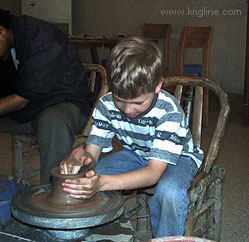
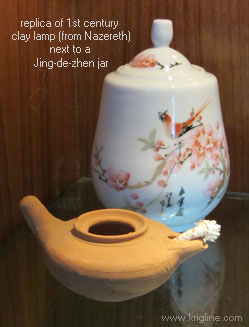 ministry.
In the song I’ll sing later, the lump of clay begins to swell with
pride when he realizes he is being fashioned into a beautiful
pitcher. But the world needs far more
ministry.
In the song I’ll sing later, the lump of clay begins to swell with
pride when he realizes he is being fashioned into a beautiful
pitcher. But the world needs far more 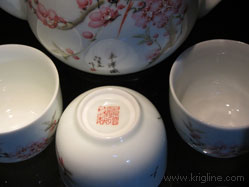 Vessels
“sealed” for use by the Emperor are likewise considered far more
valuable than ordinary pottery. That is good news for Christians,
who bear the “seal” of the Holy Spirit, and who are chosen for use
by the King of Kings!
Vessels
“sealed” for use by the Emperor are likewise considered far more
valuable than ordinary pottery. That is good news for Christians,
who bear the “seal” of the Holy Spirit, and who are chosen for use
by the King of Kings! 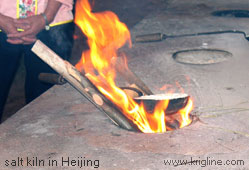 artwork
involved, and depending on the intended purpose of the vessel.
artwork
involved, and depending on the intended purpose of the vessel.
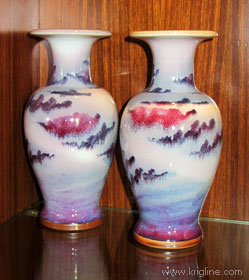 delights
to be sure that “no two pieces are the same.” No two fingerprints,
no two hands, no two eyes, no two voices are ever the same. What
more proof do you need that you are His individually crafted work
of art? It is also true that what is beautiful to one person may
not seem so beautiful to another. That is why we are not to worry
about our neighbor’s evaluation of our beauty. God is our potter.
He has made each of us unique, and to Him we are all beautiful.
delights
to be sure that “no two pieces are the same.” No two fingerprints,
no two hands, no two eyes, no two voices are ever the same. What
more proof do you need that you are His individually crafted work
of art? It is also true that what is beautiful to one person may
not seem so beautiful to another. That is why we are not to worry
about our neighbor’s evaluation of our beauty. God is our potter.
He has made each of us unique, and to Him we are all beautiful.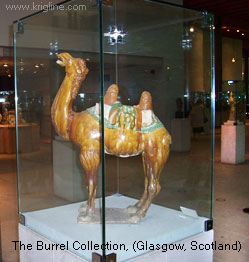 about
any museum! The exhibits are filled with pottery that proclaims
the glory of past dynasties and cultures, long after the potter’s
wheel is still. In the same way, although our Potter’s molding and
firing will only last a lifetime, we will abide forever as a
testimony to His grace and as “containers” of His glory.
about
any museum! The exhibits are filled with pottery that proclaims
the glory of past dynasties and cultures, long after the potter’s
wheel is still. In the same way, although our Potter’s molding and
firing will only last a lifetime, we will abide forever as a
testimony to His grace and as “containers” of His glory. Christ.
Christ.